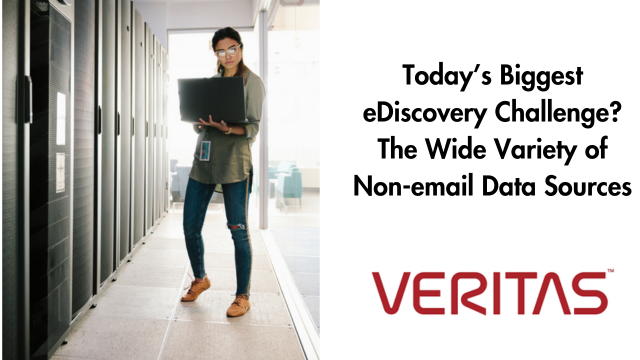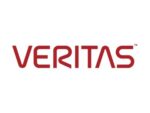
[EDRM Editor’s Note: EDRM is happy to amplify our Trusted Partners news and events. The opinions and positions are those of Veritas and Ryon Lane. This article was first published on August 23, 2023].

Does it seem like eDiscovery is more complicated and demanding than ever? There are many challenges in conducting eDiscovery today – the ever-expanding volume of data in organizations, the challenges of hiring experienced personnel who understand eDiscovery workflows and best practices, and protecting Personally Identifiable Information (PII) and other sensitive data. In addition to these challenges, eDiscovery goals still must be achieved within budgetary constraints in a turbulent economy.
By far one of the most urgent and far-reaching eDiscovery challenges organizations face today is the increasing variety of data types subject to discovery. In this post we’ll discuss why this is (arguably) the biggest eDiscovery challenge today, various types of data repositories subject to discovery and data collection, and what you should look for in a technology solution to fulfill not just your eDiscovery needs, but also your Archival and Compliance needs as well.
According to analysis of the [ComplexDiscovery] survey results by eDiscovery Today, this quarter’s results were the 7th time in eight fiscal quarters “Increasing Types of Data” was at (or tied for) the top issue of concern. That’s a bullish trend indicating just how challenging keeping pace with increasing data types has become.
Ryon Lane, Data Compliance & Governance Specialist, Veritas.
Increasing Types of Data are the Biggest eDiscovery Challenge Today
That’s a bold statement, right? But don’t take my word for it – it’s market sentiment as well as the feedback of many of you readers. The results of the most recent quarterly eDiscovery Business Confidence Survey published by ComplexDiscovery count “Increasing Types of Data” as the single most pressing issue respondents felt will most impact the business of eDiscovery over the next six months (of a choice of six options). Selected by almost 37% of respondents, “Increasing Types of Data” almost doubled the next-highest choice (“Budgetary Constraints” at 19.72%).
Was that a quarterly anomaly? Not at all. According to analysis of the survey results by eDiscovery Today, this quarter’s results were the 7th time in eight fiscal quarters “Increasing Types of Data” was at (or tied for) the top issue of concern. That’s a bullish trend indicating just how challenging keeping pace with increasing data types has become.
Types of Data Subject to eDiscovery & Compliance
eDiscovery workflows have long been established for traditional data sources like email mailboxes and archives, as well as unstructured data like office files. While automated processes are well-established for collection, processing, review, and production of data, important evidence is increasingly discovered in countless other external data sources – data sources which demand to be addressed in discovery and compliance matters today.
These data types and sources include (but are not limited to):
- Modern Collaboration Platforms: With so many teams located in remote and hybrid working environments, the ability to conduct discovery on collaboration platforms in the cloud has become a “must-have,” and these platforms are where many of the relevant and discoverable conversations occur today.
It’s important a technology solution not only supports the most common collaboration platforms like Slack, Microsoft Teams and Zoom, but that it also supports collaboration platforms used by many other organizations such as MS Teams Channel, Salesforce Chatter, Yammer, Webex Teams and more.
(See Benebone v. Pet Qwerks, et al. and Twitter, Inc. v. Musk)
- Document Collaboration: Document repositories are increasingly stored in the cloud as well. it’s important a technology solution permits for discovery on collaborative, cloud-based document solutions like Google Drive, Dropbox and Microsoft OneDrive.
(See Nichols, et al. v. Noom Inc., et al.; and Red Wolf Energy Trading, LLC v. BIA Capital Mgmt., LLC:, where defendants received court orders to produce Google Suite documents and Slack messages, and subsequently claimed to have already compiled all relevant data. The court found lack of compliance, rendering default judgment for plaintiffs.)
Consider whether collaborative attachments with live versioning are something your archiving technology solution should support.
- Mobile and Text: Data from mobile devices is routinely discoverable – especially text messages, and it’s the most asked-for type of modern data.
For this reason it’s important that a technology solution can discover text message data from providers like AT&T and Verizon, as well as messaging sources like SMS, WhatsApp and WeChat, China’s most popular messaging app.
- Financial Platforms: Many compliance investigations and legal cases involve discovery of financial data.
A technology solution should be able to collect data from platforms like Bloomberg, Symphony and Yieldbroker – sources of dynamic data becoming rapidly more important as methods of financial business communication expand.
- Other Sources: Plenty of other data sources routinely need to be addressed, and like the annual increase in the volume of our data, the number of data sources increases each year as well.
Examples include recorded / transcribed meetings, enterprise tools (e.g., IT Service Management (ITSM) tools like ServiceNow), SQL databases, JSON files and much, much more. The sky is the metaphorical limit.’
TIP: Ask your custodians about new data sources they’re using as part of business operations!
Ryon Lane, Data Compliance & Governance Specialist, Veritas.
TIP: Ask your custodians about new data sources they’re using as part of business operations!
With all the data types to support in discovery today and market feedback supporting the concern that accompanies evolving new data types, it’s hard to argue that incorporating this new data into a set of defensible eDiscovery policies has become the biggest eDiscovery challenge today.
Especially if you’re ignoring modern communication platforms, you could be violating your discovery duties, and possibly subjecting yourself to sanctions.
What to Expect from Your Technology Solution
While supporting a wide variety of data sources is important, here are six more features your technology solution should include:
- Archiving: As always, eDiscovery starts with how your data is managed and archived for information governance purposes. Conducting discovery upstream effectively begins with effective data archival – specifically journaling data.
- Ease of Use: The solution should be easy to set up and use, allowing you to be up and running quickly, ready to meet discovery deadlines.
- Full Conversational Context and Metadata: The solution should capture communications among parties in a manner that preserves the full context of the conversation. While messages may be stored individually, you shouldn’t have to re-assemble conversations message-by-message.
Additionally, your tech solution should capture data defensively, preserving the metadata as it resides in-place at the data source. This ensures that chain-of-custody is preserved and associated risks are eliminated from the collection process.
- Fully Customizable: Data sources and types vary widely, and new data sources are being introduced every year. The solution should be fully (and fairly easily) customizable to support any data type – even from proprietary data sources – as new data types emerge. And they will.
- Seamless Integration: The solution should provide seamless integration between enterprise solutions and eDiscovery search & collection functionality. A less favorable alternative – migrating data manually – is time-consuming and often leads to errors.
- Compliance with Industry Regulations: Data collected from the various data types across your environment should be managed and archived by the same tech solution helping your organization comply with all applicable regulatory obligations:
- Financial: SEC, FINRA, CFTC, SOX, MiFID II
- Pharma and Healthcare: FDA, HIPAA, FDCA, ARRA
- Governmental: FOIA, FISMA
- Energy and Utilities: FERC, DOE, NERC, State Regulations
- International/Commercial: FTC, GDPR
- Financial: SEC, FINRA, CFTC, SOX, MiFID II
Your eDiscovery, Archival, and Compliance (and even Records Management) are interrelated. Your technology solution for data governance and compliance needs to address those needs across the board.
TL;DR
The days of simple eDiscovery workflows – effectively collecting only from email again and again – are over. The ability to connect to and defensibly collect from a wide variety of data types (that will continue to expand across your organization) is simply a MUST-HAVE in discovery, archival and compliance operations today.
Your eDiscovery, Archival, and Compliance (and even Records Management) are interrelated. Your technology solution for data governance and compliance needs to address those needs across the board.
Ryon Lane, Data Compliance & Governance Specialist, Veritas.
Addressing the increasing variety of data types within your organization has arguably become the biggest challenge in eDiscovery, and depending on what is discoverable, any data in your business environment could become discoverable, depending on the jurisdiction, data sharing agreements, and classification of data
And it’s not just GDPR or CPRA! HIPAA, Privacy notices, and all the new state privacy legislation that is coming…
It is key to understand the data you have, what type of data that it is, where that data is located, and how that data is used in business processes.
For more information on how Veritas Alta™ Capture can support data capture and collection from more than 120 sources, click here.


